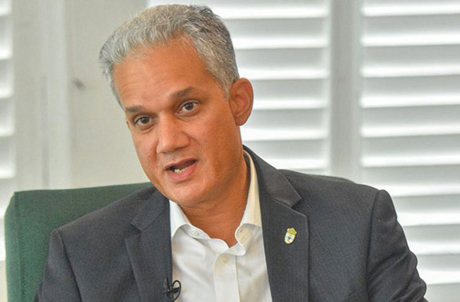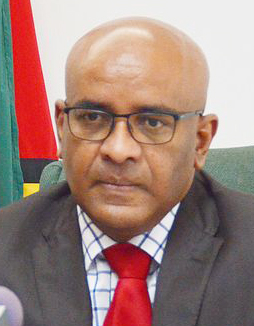Guyana Focus
in Guyana

Infrastructure bottlenecks, skilled labor shortages, and weaknesses in electricity supply are the major obstacles to growth in Guyana. That’s according to the International Monetary Fund’s (IMF) preliminary staff findings, following an official visit by a mission to Guyana from June 3rd – 14th this year.
During the visit, the IMF team met with Prime Minister Moses Nagamootoo, Finance Minister Winston Jordan, Minister of Legal Affairs and Attorney General Basil Williams, Central Bank Governor Gobind Ganga, other senior
officials, representatives from the private sector, banks, the opposition party, labor unions, and other stakeholders. The IMF observed that Guyana’s medium-term prospects are very favorable, given the commencement of oil production in 2020. It says this will present an opportunity to scale-up capital and current spending at a measured pace over the medium term to address infrastructure gaps and human development needs, while paying attention to debt sustainability concerns at the same time.
The mission noted that last year, the economy grew by 4.1%, up from 2.1% in the previous year. The IMF forecasts that the economy will grow by 4.4% in 2019, driven by continued strength in the construction and services sectors ahead of oil production in 2020, and a strong recovery in the mining sector. Incidentally, Guyana is forecasted to become one of the fastest growing economies in the world once oil production gets underway.
However, export performance was weaker last year, combined with higher imports of high value inputs related to oil production, contributing to a weaker current account balance. In 2018, the current account deficit rose to 17.5% of GDP, up from 6.8% in 2017. The deficit was largely financed by Foreign Direct Investments (FDI) related to the petroleum sector.
Although the international financial watchdog was largely positive about current economic conditions, it made several recommendations, including the implementation of structural reforms to support economic diversification and achieve inclusive and equitable growth; adhering to a fiscal framework that constrains borrowing to achieve a balanced budget in the near- to medium-term; strengthening transparency and governance; and introducing exchange rate flexibility as part of the country’s monetary policy framework.
It must be noted that observations made by the IMF mission are largely predicated on submissions made by the government and in some instances may not accurately reflect real conditions in Guyana.
In the area of structural reforms, the IMF acknowledged the government’s proposal to enhance economic activities by increasing investments in roads, electricity, and telecommunication services but suggested that simultaneous investments should also be made in upgrading the education system, which it says is critical for enhancing the skills and improving employment prospects for Guyanese. This call was made in light of the anticipated increase in demand for skilled labour on the back of oil exploration and production activities.
To address the skills gap and satisfy the demand for labor, the IMF took the liberty of suggesting that Guyana should adopt more liberal or open immigration policies, including enabling the free movement of all categories of workers from other CARICOM countries. While many Caribbean nationals are already working in Guyana, it is believed than an open door policy on immigration would not be in the best interest of droves of unemployed Guyanese.
It also proposed that Guyana should promote more flexible working arrangements which could help increase female labor participation; and implement further regulatory and administrative reforms in the areas of property rights and insolvency; and reduce bureaucratic red-tape to enhance competitiveness. Incidentally, these issues have been on the drawing board for many years but implementation has not been forthcoming.
To ensure the achievement of fiscal responsibility, the IMF mission recommended complementing the country’s National Resource Fund (NRF) legislation with a fiscal framework that constrains borrowing to achieve a balanced budget in the near- to medium-term. It noted that in order to achieve this target, the annual non-oil deficit should not exceed the expected transfer from the NRF.
This, the IMF report stated, would ensure that excessive public expenditure will not lead to debt growing at the same time as the NRF accumulates. It is also necessary to preserve the spirit of the NRF framework, which appropriately aims to save part of the income from oil as net wealth for future generations. The pace of scaling-up public spending as a result of oil revenues needs to be gradual to reduce bottlenecks from absorptive capacity constraints, avoid waste, and minimize macroeconomic distortions related to “Dutch” disease that has often inflicted economies experiencing sizable increases in resource-based income.
In Guyana’s case, Dutch disease could manifest itself as a result of the massive contribution of oil to the economy and a consequent shift of labor to the oil sector, resulting in a decline in other sectors such as agriculture. As oil revenues increase, the Guyana dollar will become stronger, causing exports to become more expensive and imports cheaper.
In terms of monetary policy, the IMF recommended that the government reassess the monetary policy stance on an ongoing bases to reflect changes in macroeconomic outlook or risks surrounding the outlook. It encouraged the government to maintain exchange rate flexibility as part of the monetary policy framework, given the expected large and potentially volatile foreign inflows from oil production; and to consider developing the necessary infrastructure for a suitable monetary policy framework that facilitates economic growth and adjustment to oil price shocks while maintaining price stability.
While the IMF mission acknowledged efforts by the government to strengthen institutional, governance and management practices to reduce vulnerability to corruption, it noted that greater urgency should be attached to these reforms ahead of the expected increase in public spending as oil production begins.
The mission encouraged building on recent progress in strengthening transparency and governance, noting that Guyana completed its first Extractive Industries Transparency Initiative (EITI) Report in 2019 and started implementing its recommendations to further enhance transparency in the extractive industry.
While the EITI initiative is a step forward for the extractive industries, transparency and governance in other areas of the economy are among the major hindrances to development.
In addition, the IMF noted that the recent re-establishment of the Integrity Commission has resulted in over 50% of politically exposed persons (PEPs) and other required officers making declarations within the first year. It said ensuring greater compliance over time with the asset declaration regime would underscore the authorities’ support and commitment to the UN convention against corruption.
Incidentally, corruption remains one of the major problems in Guyana, and the fact that only 50% of those required to make declarations did so, is in itself largely due to corruption.
The mission also welcomed the progress made in strengthening public procurement, and encouraged the authorities to ensure timely compliance with existing regulations and take further actions to fortify the transparency of the procurement system.
Whether or not the public procurement system is actually working is highly questionable, although regulations do exist on paper.
The international financial institution also said that commendable progress has been made in strengthening the framework for anti-money laundering and counter terrorism financing, based on the 2017 national risk assessment. Guyana has been officially removed from the European Commission’s Money-Laundering Blacklist in February 2019 and is scheduled to undertake a mutual evaluation by the Caribbean Financial Action Task Force in 2022.
It was observed that while the financial sector remained stable, nonperforming loans (NPLs) in the banking sector remains high. The total loans ratio have fallen slightly to 11.9 percent as of the end of December 2018, from 12.2% a year before. The IMF recommended an Asset Quality Review to examine banks’ credit risks and enhance financial sector stability.
Overall, the IMF was positive about Guyana but its analysis did not take into account major problems that plague the Guyanese economy, including political uncertainty, high levels of crime, pervasive corruption, poor governance and a lack of transparency.
blocks exposes the pittance
Exxon paid - Mangal

So says former Petroleum Advisor to the government Jan Mangal who pointed out that when government renegotiated the PSA with ExxonMobil’s subsidiary Esso Exploration & Production Guyana Limited (EEPGL), and partners back in 2016, the company already boasted confirmed reserves of over 1.4 billion barrels of oil.
“Please remember there was already 1.4 billion barrels of oil confirmed when Guyana accepted the pittance of US$18 million for a signing bonus, the pittance of less than 2% royalty, and forfeited billions in tax,” Mangal told Stabroek News pointing to the zero corporate tax rate the company benefits from.
“Is there any confirmed oil in the CGX block? No, there is not,” he added.
In late May, oil explorer Frontera Energy Corporation, finalised a joint venture agreement with fellow Canadian oil explorer CGX Energy Inc under which it obtained a 33.33 per cent working interest in CGX’s two offshore blocks. Under the terms of the agreement, Frontera was required to pay a signing bonus of US$33.33 million.
“On May 28, 2019, the transfers of the 33.333% interest in both the Corentyne and Demerara Prospecting Licenses were completed. The transfers are effective May 20, 2019,” CGX had said in a statement.
CGX, under a renegotiated work plan with the Guyana Government, is required to drill its Utakwaaka well on the Corentyne block by November 27, 2019 with an additional exploration well to be drilled by November 27, 2022. The Corentyne block amounts to 1,125,000 net acres offshore Guyana in shallow water, adjacent to ExxonMobil’s Stabroek block.
On the 750,000 net acres offshore Demerara block, an exploration well is required to be drilled by February 12, 2021 with a further exploration well by February 12, 2023.
CGX had previously faced financial issues and the joint venture agreement with Frontera sought to enable CGX to finance the drilling costs related to the two offshore blocks and also provide financial support as a critical step in a series of transactions that CGX sought to undertake in order to restructure its liabilities and provide for sufficient working capital to enable it to advance its offshore exploration projects in Guyana.
Mangal said that Frontera’s US$33 million signing bonus has to be looked at holistically and pointed out that the nation must be reminded that Exxon paid Brazil close to US$1 billion, without confirming oil in their pre-salt basin, for 71,500 acres.
The Stabroek Block, is 6.6 million acres (26,800 square kilometers). The block is equivalent in size to 1,150 Gulf of Mexico blocks and contains multiple prospects and play types representing additional multibillion barrel unrisked exploration potential, according to ExxonMobil’s partner in the block, Hess.
With more than three quarters of the block still to be explored, Exxon has already made 13 discoveries and has estimated gross recoverable resources of approximately 5.5 billion oil-equivalent barrels.
“In Brazil there was no confirmed oil but Exxon paid a signing bonus of close to US$ 1 billion. And our politicians continue to forfeit tax on other blocks, even this year,” Mangal lamented.
Mangal also said that Guyana should have been wary of not only its deal with ExxonMobil but should examine oil blocks given to small companies like CGX, Ratio and Mid Atlantic Oil and Gas. The owners of the latter companies will reap large monetary rewards when they farm out portions of their blocks, he said.
“These little speculators like CGX, Ratio, and Mid-Atlantic…are never good for a country. Whenever you see those getting blocks, you know the country is being royally screwed,” he said.

Possession remains an offence; however, persons will not be sentenced to terms of imprisonment as in the past, the release said.
This is the first of several steps that government intends to take as it considers the recently submitted Caribbean Community (CARICOM) Report on the use of marijuana, and in particular, “usages by our Rastafarian brothers and sisters who require it for use in their worship and sacrament”.
The decision comes after a long period of lobbying of the government by the Rastafarian community and key members of the governing partner, the AFC.
The taking of a major decision at this point will raise concerns as following the CCJ ruling of June 18, Cabinet should no longer be functioning.

During a press conference last week, Jagdeo said that the President has not yet responded to the letter Opposition Chief Whip Gail Teixeira sent the Ministry of the Presidency four days earlier, in which the Opposition indicated that Jagdeo is willing to meet at any time to address the selection of the new GECOM Chairman.
This is due to the fact that retired Justice James Patterson demitted office after a ruling by the Caribbean Court of Justice found his appointment by the President to be unconstitutional and flawed.
The Opposition Leader said that he was hoping for a response from the President soon, adding that it is his intention for the 18 names on the three lists previously rejected by the President to form the basis for their discussions.
But the Opposition has already started the process of soliciting new names. Jagdeo said that selecting names from the Commonwealth is being considered if necessary because it is permitted by law.
This contention was previously raised by another member of the People’s Progressive Party (PPP), Anil Nandlall, who said that it should be so, since the President’s consideration of those names was flawed. He added that the President could perhaps justify why those names were rejected, first.
On Wednesday of last week, Leader of the Alliance for Change (AFC), Khemraj Ramjattan, in addressing this issue, had said that Jagdeo should not “dump” six names on the President, but that he must meet with the President and deliberate on the six names together.
Jagdeo said that it is not his intention to dump six names on the President.
Under normal circumstances, the Opposition Leader would develop a list without the President’s input.
The AFC Leader had added that the CCJ Judgment Summary on Patterson’s appointment orders the two parties to instead deliberate on the names together.
In truth, in naming that method as a possible solution to the current impasse, the judgment only suggests it, saying that the parties could “perhaps” take that course of action.
When asked if he would be open to doing so, Jagdeo said that he is not above it, and that he will do what is necessary to ensure they meet consensus for a speedy process to the General and Regional Elections.
A number of government and police officials confirmed that polygraph tests were conducted recently on a number of senior police officials who are in sensitive positions.
Media reports indicate that not all police top brass were given the tests which were conducted by foreign experts. However, three persons who took the tests were identified as Crime Chief, Lyndon Alves, Deputy Commissioner Paul Williams, and head of the police Special Organised Crime Unit (SOCU), Sydney James.
Other SOCU officials and a number of deputy commissioners were among those who were asked to take the tests.
While the details of the tests are not out yet, it would be viewed with lots of interest.
The police force is currently under scrutiny at the moment with Alves on administrative leave pending an internal probe of corruption.
Reportedly, the government has been liaising with the US Embassy for the polygraph tests.
Minister of Public Security, Khemraj Ramjattan, and Government have been moving to have the tests done as part of the vetting process for being in the force.
The police force, and government by extension, is under pressure for an independent probe after a series of allegations by whistle-blowing cops which pointed to criminal activities in the force.
The allegations came from ranks in Berbice who claimed that colleagues were working closely with criminals.
The phone numbers of policemen were in the phone of a dead bandit who was killed in Berbice weeks ago during a confrontation.
There were other accusations which allege that ranks with knowledge of superiors would even lend protection to drug smugglers. One rank even collected money to execute one of his colleagues who was a witness in a drug case.
Last week, it was reported that the Crime Chief, a former commander in Berbice, and who would perform duties of the police commissioner when he is out of the jurisdiction, was placed on administration leave.
Alves was one of four deputies appointed last August as part of reform process for the force.
politicize judges
In a statement last Saturday, the Court addressed the content of posters shared on Facebook by the People’s National Congress Reform, A Partnership for National Unity and at least one executive member of the Alliance For Change. The posters, which were subsequently removed, featured the images of Justices Gino Persaud and Simone Morris-Ramlall. Without identifying any person, the Court said in the terse statement that it was “calling on members of the public to refrain from associating Judges and Judicial Officers with any political party or activity.”
“The Judiciary reaffirms its independence and integrity and rejects any attempt to tarnish and discredit its reputation,” the statement added.
The posters, headlined “Confidence in Youth Leadership” and boasting “Promised Delivered,” identified several young professionals, including supporters of the governing coalition who hold leadership positions in state entities. However, several public servants, including the judges, were included in the post.
To advertise in ICW call
Call 905-738-5005